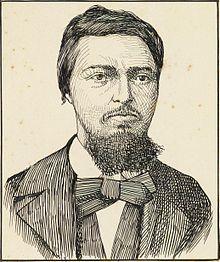Aureliano Lessa | |
|---|---|
 | |
| Born | Aureliano José Lessa 1828 Diamantina, Brazil |
| Died | 21 February 1861 (aged 32–33) Serro, Brazil |
| Occupation | Poet, journalist |
| Nationality | |
| Alma mater | Faculdade de Direito de Olinda |
| Subject | Mal du siècle |
| Literary movement | Romanticism |
| Notable works | Poesias Póstumas |
Aureliano José Lessa (1828–1861) was a Brazilian poet, adept of the "Ultra-Romanticism" movement. Born in Minas Gerais in 1828, he moved to São Paulo in 1847 to study Law, but received his bacharel degree at the Faculdade de Direito de Olinda, in Pernambuco, in 1851. He worked as attorney general in the city of Ouro Preto, and also as a lawyer in the cities of Diamantina and Serro.
During his stay at São Paulo he met the authors Álvares de Azevedo and Bernardo Guimarães. With them, he planned a volume of poetry called As Três Liras (in English: The Three Lyres), that ended unsuccessful. Along with those and others, he was a member of a club named "Sociedade Epicureia" ("Epicurean Society").
Aureliano only wrote some texts to newspapers of São Paulo and Minas Gerais during his lifetime. His poems were compiled and published posthumously in 1873 by his brother, Francisco José Pedro Lessa, under the name of Poesias Póstumas (in English: Posthumous Poetry).
A heavy drinker, Lessa died on February 21, 1861, because of a lesion in his heart, caused by his alcoholism.
Aureliano was the uncle of Pedro Augusto Carneiro Lessa.
External links
[edit]- A poem by Aureliano Lessa (in Portuguese)
- Aureliano Lessa's profile at the official site of Cravo Albin Dictionary (in Portuguese)
- Poems by Lessa (in Portuguese)
Well, that’s interesting to know that Psilotum nudum are known as whisk ferns. Psilotum nudum is the commoner species of the two. While the P. flaccidum is a rare species and is found in the tropical islands. Both the species are usually epiphytic in habit and grow upon tree ferns. These species may also be terrestrial and grow in humus or in the crevices of the rocks.
View the detailed Guide of Psilotum nudum: Detailed Study Of Psilotum Nudum (Whisk Fern), Classification, Anatomy, Reproduction